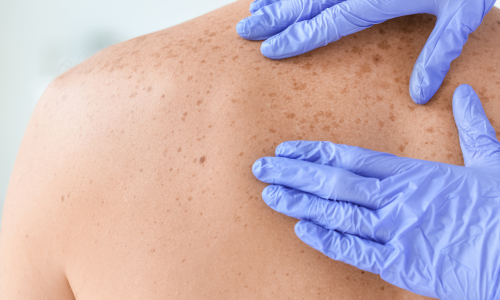What is the aim of the service?
The Consultant Connect teledermatology project is part of the Leeds Cancer Programme, which sees partners from across the city, including Leeds Teaching Hospitals NHS Trust (LTHT) and NHS West Yorkshire ICB, working together to transform cancer services.
It was launched in 2018 to provide primary care clinicians with a secure platform to send images of suspicious lesions to dermatology consultants, resulting in a speedier diagnosis, with many patients being able to be discharged without attending hospital.
What were the main drivers for change?
At the time the project was launched, there was a shortage of consultant dermatologists and an increase in the number of skin cancer referrals from primary care clinicians. When a consultant dermatologist at LTHT analysed the data for patients referred by primary care and subsequently discharged without any clinical intervention, he realised that this amounted to about one-third of the referrals.
These findings led to the idea that there should be a way for consultants to support primary care in making a decision as to whether a referral is needed or not, without the patient always needing to visit hospital. This is how the idea of giving primary care clinicians the tool to securely take and share IG-secure images of suspicious lesions with consultants was developed; teledermatology.
A successful teledermatology pilot study led to national cancer transformation funding provided via the West Yorkshire and Harrogate Cancer Alliance. A steering group with representatives of every organisation on the pathway was established to progress and oversee the project.
How it works
Photos of patients’ skin are taken using the PhotoSAF feature within the secure Consultant Connect App and the photos are then included on the e-RS 2WW referral pathway. No photos taken via the Consultant Connect App are saved to the clinicians’ phones, instead they are automatically saved in a secure cloud which can be accessed by logging in to Consultant Connect via a browser.
The PhotoSAF feature met Leeds’ requirements – particularly around information governance, compliance and ensuring the new process worked for both primary care and secondary care. Because the app is so intuitive, clinicians didn’t need any training to get started.
Impact 6 years on
Of the 13,696 skin referrals received by LTHT from across the city of Leeds in the 12 months from April 2023 to April 2024, approximately 12,800 of referrals included clinical images, 85% (11,000) of which were suitable to be clinically assessed using teledermatology.
Following the clinical assessment of the images, using teledermatology, for 11,000 skin referrals:
- 39% of patients were able to be discharged from the 2WW pathway and returned to their GP
- 26% of patients were put on the direct-to-surgery pathway, meaning in place of their first 2WW appointment, they have their lesion assessed and biopsied
- 18% of patients were accepted to be seen face-to-face in 2WW clinics
- 5% of patients were removed from the 2WW cancer pathway and downgraded to the LTHT dermatology pathway
- 1% of patients were referred to low-risk community BCC service
Tom Daniels, Senior Programme Lead (Planned Care, Cancer and Healthy Adults), Leeds Health and Care Partnership, comments:
‘Using teledermatology as part of our 2WW pathway has been a huge success in terms of efficiency and patient experience. Our assessment suggests that in 2023/24, 39% of 2WW patients were discharged on the basis of clinical assessment of their images. This freed up a significant amount of capacity in secondary care and reduced unnecessary anxiety, worry and stress for patients who did not need to be seen on this pathway.
Of course, savings in consultant time are partially offset by the fact that images need to be triaged, however, triaging images averages out at just 75 seconds per referral. If all of these patients were seen, then they would each receive an appointment which would last around 12 minutes. So, for every 1,000 images received we would expect to save nearly 180 hours of clinical time. In 2023/24 we received over 11,000 images, so the time saved is almost equivalent to a full-time member of staff!’
If you have any questions or would like to find out more about using Consultant Connect for Teledermatology email hello@consultantconnect.org.uk or call us on 01865 261 467.
Related links:
- Consultant Connect Performance Benchmarks
- World Skin Day: How Consultant Connect supports the best care for patients with dermatological conditions
- Photo Messaging Advice & Guidance
